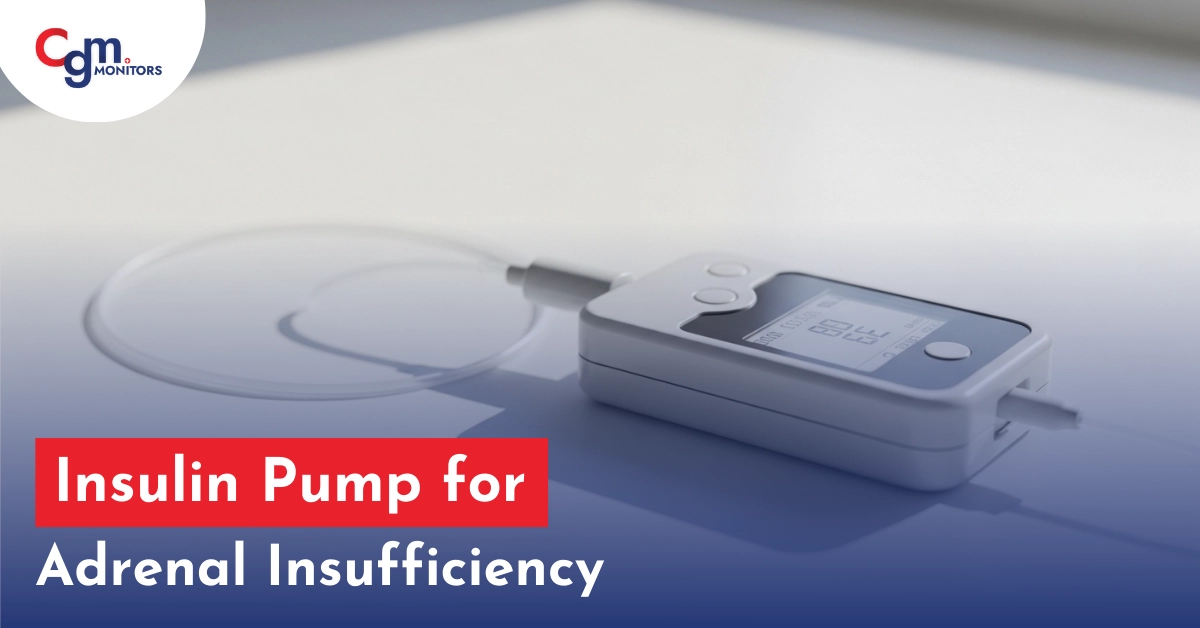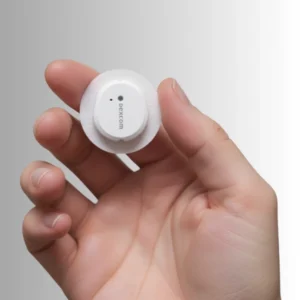Table of content
Addison’s Disease, also known as Adrenal insufficiency, occurs when the adrenal glands on top of the kidneys, fail to produce essential hormones like cortisol. For individuals managing this condition, any programmable insulin pump (except a few like V-Go pump patches) can work as a cortisol pump, offering an innovative way to mimic natural hormone rhythms by delivering medications such as Solu-Cortef (an anti-inflammatory glucocorticoid). This approach can replicate the body’s cortisol cycle, ensuring stable hormone levels throughout the day.
How an Insulin Pump Can Help
Addison’s disease or Adrenal insufficiency is a result of damaged adrenal glands which produce certain important hormones, one of which is cortisol. Insulin pumps which are traditionally used to manage diabetes by delivering insulin in precise, programmable doses, can deliver Solu-Cortef (hydrocortisone) as well, in a way that mirrors the body’s natural hormone fluctuations;
- Morning Surge: High levels energize the body for daily activities. Using these insulin pumps can help you change your dosage levels as well.
- Midday Drop: Moderate levels maintain regular bodily functions.
- Nighttime Low: Minimal levels promote restful sleep.
Using a programmable insulin pump, such as the ones from Medtronic, Tandem Mobi, or Omnipod Insulet, can help you manage dosages of this cortisol-like medication as per your routine. You may check out a range of these insulin pumps here. CGM Monitors delivers it at your door, that too without any delivery charges within the USA.
Dosage Conversion
Since the insulin pumps are primarily designed for insulin therapy, they calculate your dosage in insulin bolus units, so converting the dosage for Solu-Cortef is essential. For example, one user shared her experience, she programmed her pump to deliver 20 units of insulin in order to provide 10 mg of Solu-Cortef. Individual dosing will vary based on the pump type and medical recommendations, so consulting a doctor is important.
While some studies may show that these insulin pumps can be used for Hydrocortisone therapy, and you can find a range of Insulin Pumps here. Please always consult your doctor before taking any medical action.
Causes of Adrenal Gland Damage
Several factors can damage the adrenal glands, leading to insufficiency. These include:
Autoimmune Disease (Autoimmune Addison’s Disease):
The most common cause of Addison’s disease is an autoimmune reaction where the immune system attacks adrenal glands.
Individuals with other autoimmune conditions, like Type 1 diabetes or autoimmune thyroid disease, may be at higher risk due to Multiple Autoimmune Syndrome (MAS).
Infections:
Tuberculosis (TB): Historically, a leading cause of adrenal damage, as TB can infect and impair adrenal function.
Fungal Infections and HIV/AIDS: Both conditions can damage adrenal glands and lead to insufficiency.
Adrenal Gland Bleeding:
Adrenal Hemorrhage: Can occur due to trauma, surgery, or severe infections such as meningococcal septicemia.
Waterhouse-Friderichsen Syndrome: Rare but serious, it involves extensive adrenal bleeding.
Genetic Disorders:
Congenital Adrenal Hyperplasia (CAH): A genetic disorder affecting cortisol and aldosterone production.
Adrenal Tumors: Genetic conditions can increase the risk of tumors, affecting hormone production.
Long-Term Use of Steroids:
Prolonged use of synthetic steroids like prednisone suppresses the adrenal glands’ natural cortisol production. Abruptly stopping steroids without tapering can cause insufficiency.
Cancer and Tumors:
Metastatic cancers, such as lung or breast cancer, may spread to adrenal glands.
Primary adrenal tumors, benign or malignant, can disrupt hormone production.
Chronic Stress:
Prolonged stress can overwhelm adrenal glands, eventually leading to dysfunction.
Medications and Toxins:
Certain antifungal or chemotherapy drugs and heavy metal toxicity can damage adrenal glands.
Hemorrhage or Shock:
Severe trauma, surgery, or shock can impair blood flow and oxygen supply to adrenal glands.
Testing and Personalization
Trial and error in medications are now preventable to a certain extent. Pharmacogenomics testing, commonly known as PGx testing gives you insights into your genetic makeup, helping doctors in prescribing the right drug and the right dosages. To take an example here, RPh LABS provides at home Pharmacogenomics testing that tells how your body can respond to about 250+ drugs.
Cortisol Clearance Test
Similar to the ACTH stimulation test, the cortisol clearance test measures how quickly your body metabolizes hydrocortisone. It identifies whether you’re a rapid, normal, or poor metabolizer, enabling precise dosing adjustments.
Hydrocortisone Metabolism
Hydrocortisone is primarily metabolized in the liver by cytochrome P450 enzymes, particularly CYP3A. Genetic factors influence enzyme activity, making pharmacogenomics (PGx) testing valuable for tailoring treatments.
What Are Adrenal Glands?
The adrenal glands sit atop the kidneys and produce hormones critical for metabolism, immune response, blood pressure regulation, and stress management.
Functions of Adrenal Hormones
- Cortisol: Manages stress, regulates metabolism, and controls inflammation.
- Aldosterone: Maintains blood pressure and electrolyte balance.
- Adrenaline/Noradrenaline: Prepares the body for “fight or flight.”
What is Adrenal Insufficiency?
Adrenal insufficiency occurs when the glands fail to produce enough hormones due to damage. Symptoms include:
- Chronic fatigue
- Low blood pressure
- Abdominal pain
- Salt cravings
- Skin darkening in primary adrenal insufficiency
How to Check Adrenal Function
To diagnose adrenal insufficiency, doctors perform blood tests to measure cortisol and ACTH levels. Imaging studies may also help identify adrenal damage. Regular monitoring ensures early detection and management.
Final Thoughts about Insulin Pump for Adrenal Insufficiency
Adrenal glands produce various hormones, including cortisol. The damage of these glands results in insufficient cortisol that leads to Addison’s disease, also known as Adrenal insufficiency. Studies show that programmable Insulin Pumps which are primarily built for insulin therapy can be used as cortisol pumps. However, dosage conversion would probably be required.
Disclaimer: This blog is for informational purposes and does not serve the advice of your healthcare specialist. Please always consult a doctor before taking any medical action.










Write a comment
Your email address will not be published. All fields are required